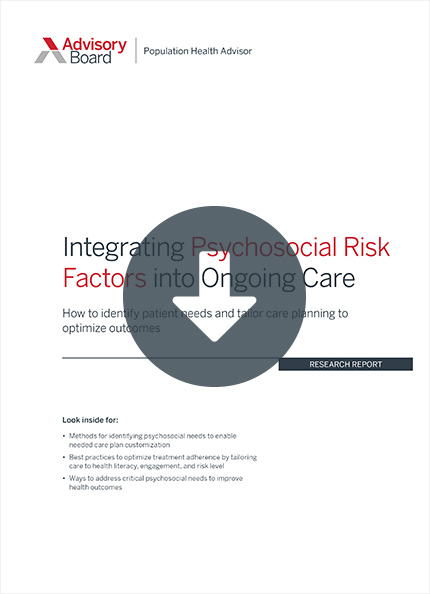Auto logout in seconds.
Continue LogoutHealth care delivery is incomplete without addressing patients’ psychosocial needs. Left unaddressed, these needs drive avoidable utilization and readmissions, and excess health care spending.
To optimize outcomes and succeed under value-based reimbursement models, leading population health managers identify patients’ psychosocial risks and tailor care plan interventions accordingly.
This research report makes the case for incorporating psychosocial needs into ongoing care, offers a blueprint for staff deployment across different interventions, and provides 18 case studies of providers that have successfully tailored interventions based on psychosocial needs.
Successfully tailoring interventions to advance population health goals requires a two-step approach tailored to patient risk.
Step 1: Assess psychosocial needs
- All patients: Implement self-report questionnaires as part of routine interactions
- At-risk patients: Conduct proactive telephonic outreach and work with community partners to fill knowledge gaps about patient needs
- High-risk patients: Perform in-depth bedside assessments and home visits
Step 2: Tailor psychosocial support
- All patients: List psychosocial needs in electronic chart across interactions and educate patient about community resources
- At-risk patients: Accommodate health literacy and engagement levels, and ensure warm handoff to needed community services
- High-risk patients: Actively navigate psychosocial care
Special Report: Evidence-Based Interventions for Key Psychosocial Needs
Synopsis of best-in-class programs to address psychosocial needs that significantly impact health outcomes, including:
Don't miss out on the latest Advisory Board insights
Create your free account to access 1 resource, including the latest research and webinars.
Want access without creating an account?
You have 1 free members-only resource remaining this month.
1 free members-only resources remaining
1 free members-only resources remaining
You've reached your limit of free insights
Become a member to access all of Advisory Board's resources, events, and experts
Never miss out on the latest innovative health care content tailored to you.
Benefits include:
You've reached your limit of free insights
Become a member to access all of Advisory Board's resources, events, and experts
Never miss out on the latest innovative health care content tailored to you.
Benefits include:
This content is available through your Curated Research partnership with Advisory Board. Click on ‘view this resource’ to read the full piece
Email ask@advisory.com to learn more
Click on ‘Become a Member’ to learn about the benefits of a Full-Access partnership with Advisory Board
Never miss out on the latest innovative health care content tailored to you.
Benefits Include:
This is for members only. Learn more.
Click on ‘Become a Member’ to learn about the benefits of a Full-Access partnership with Advisory Board
Never miss out on the latest innovative health care content tailored to you.


